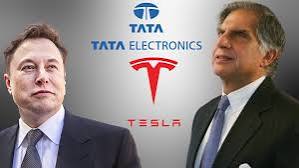A Tata-Tesla deal has just won India a big strategic edge.
By the end of 2026, the first semiconductor chip from the new plant being set up by the Tata Group and Taiwan’s Powerchip Semiconductor Manufacturing Corporation (PSMC) in Gujarat’s Dholera, will be ready to roll out, according to Frank Huang, chairman of PSMC.

The central and state governments are together estimated to subsidise up to 70% of the project cost, with the Dholera unit slated to become India’s first commercial semiconductor fab.
But much before the first chips are shipped out of the Dholera plant, Tata has won a deal that can put India in the league of big strategic players. Tata Group firm Tata Electronics is understood to have signed a strategic deal with Tesla to procure semiconductor chips for its worldwide operations.
Chips are the brains of electronic gadgets and are used in everything from missiles to aircraft to washing machines to smartphones to credit cards as well as to run crucial infrastructure such as electricity grids.
This is a proud moment for Tata and an important milestone for India. With chips made by an Indian company powering cars Tesla makes globally, India has come of age. Taiwan, China and South Korea have dominated chip supplies to global manufacturers and India will soon join that league.
Dependence of global manufacturers for chips on a country brings that country strategic power. China, on account of its own manufacturing volume of chips as well as of Taiwan which it vows to capture, has held great power over the rest of the world. As the Western world estranges from China, it is desperately pouring money into chip manufacturing to free itself from the dependence on China.
If a country buys chips from another country, it implies a critical dependence and a strategic handicap because supply shocks can bring a country to a grinding halt. On the contrary, a country that supplies chips to others enjoys a strategic edge.
If India is able to create a sizable capacity in making mature or legacy chips, which don’t require too much innovation, it can not only achieve self-reliance but can also turn into a reliable supplier to bigger countries which would prefer to focus on advanced chips.
While it may take India a long time to manufacture cutting-edge chips, it can soon make a place for itself on the global chip value chain by focusing on legacy chips.